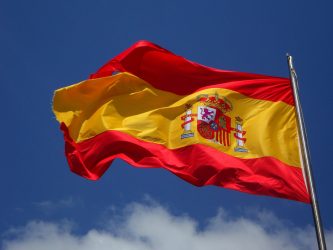 Spain’s Ministry of Consumer Affairs has written to the teams in the country’s top football division warning them any gambling sponsorship agreements must end at the conclusion of the 2020-21 season.
Spain’s Ministry of Consumer Affairs has written to the teams in the country’s top football division warning them any gambling sponsorship agreements must end at the conclusion of the 2020-21 season.
When the Royal Decree on advertising is published in the state’s Official Bulletin, something the letter from Minister Alberto Garzón said would happen in the coming days, all new partnerships between sports teams and gaming companies will be prohibited.
Existing sponsorship deals will be allowed to continue through a transitional period, which may not extend further than the end of the current sporting season, at which point they must end.
The Ministry advised those teams that have recently signed new sponsorship deals, that cover a term beyond the transitional period, will be deemed unlawful when the Royal Decree comes into force.
It therefore requested that the clubs aim to adjust their sponsorship contracts accordingly.
The letter pointed to data from the market showing what it refers to as a “worrying situation”. It stated that 4 years ago, some 29% of 18-25 year olds began engaging in gambling activities, a figure which had risen to 40% by.
Garzón also claimed that the average spend of young people on gambling has also increased by 13% year-on-year.
It claimed that scientific data shows that starting gambling at earlier ages is a precursor to gambling-related harm, and that there is a direct link between betting advertising and the rate of new bettors.
The situation, it said, had probably been aggravated as a result of the novel coronavirus (Covid-19) pandemic, and the consequent economic difficulties many are facing. It states that the most vulnerable families may tend to believe that gambling can be used as a way of relieving financial difficulties.
Having pledged to do so last year, the Spanish has been preparing new restrictions on gambling advertising throughout 2020. Initially, new controls introduced in February restricted gambling ads on radio and TV to between the hours of 1am and 5am, with some exceptions made for advertising around live sports broadcasts and real-money contests.
At that point, sports companies were still permitted to strike sponsorship deals with gambling companies.
However, the restrictions were subsequently amended in April in what was intended to be a temporary response to the Covid-19 pandemic. These temporary plans, including additions to prohibit both bonuses and sports sponsorships were adopted into regulations which were then sent to the European Commission for approval.
Results published this month showed that Spain’s online gambling market grew 17.7% year-on-year in the second quarter of 2020, as the growth of online casino and poker offset declines for sports betting.
Total gross revenue of €208.9m (£189.2m/$245.2m) for the three months to 30 June did, however, represent a 4.2% decline compared to the first quarter of the year.












